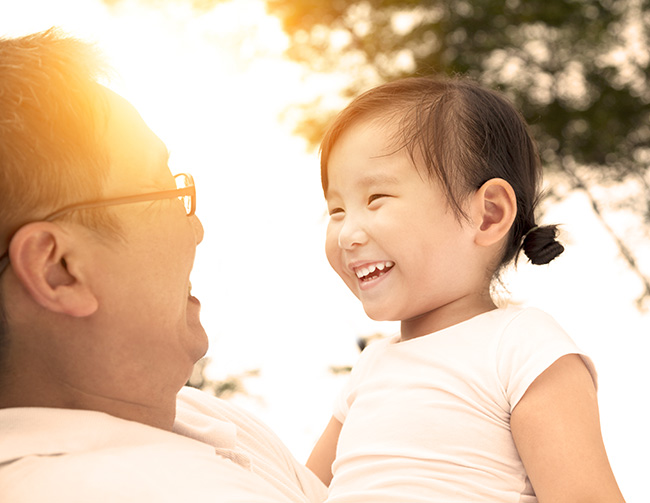16-20 months old
- The child will become more and more independent. Hence, the child may want to finish somethings on his/her own and then refuse the suggestions given by the caregiver. The child will be interested in other peers but also feel unhappy when the caregiver gives attention to other children (i.e. sibling).
- At this stage, let the child develop a habit before sleep every night. For example, the reading time every night. Read in an environment that would not be bothered by other sound or things, so that the child can focus on listening to your voice and pay attention to the rich expressions during reading. After reading the book, kiss the child and gently tickle him/her (do not overexcite the child), and finally hug the child.
- When the family sits by the dining table, let the child sits on the children’s chair and encourage the child to eat independently with tableware. Let the child drink water with a small glass so that the child can practice and try. Even though the child could stain the seat or have food all over the floor, give positive encouragement to the child after the child completes the task.
20-24 months old
- The child learning being alone can become very independent. The child would want to do all things (even if they are beyond his/her capacity) and he/she expects to “realize immediately” all things he/she wants. The child would feel instantly disappointed and depressed if things don’t go his/her way. The child would like to play with other children but could not really share with others. The child like to do simple house chores and put away his/her towy with your help.
- When your child plays with other children, stay close and guide the child. Prepare may same types of toys to help the child practice sharing with others and tell the child with affirmation of him/her sharing toys with others, such as “I saw you sharing your toys with Jacky. That’s wonderful.”
- Go out on a holiday and have picnic with the child. Before the picnic, let the child help with preparing simple food and choose his/her preferred snacks and drinks. Maybe the good friends of the child would like to join also. Let the child practice putting food into his/her mouth during picnic.

24-30 months old (2-2.5 years old)
- At this stage, the child can more independent and wish to do some things independently (i.e. eating or taking off/putting on clothes). The caregiver should let the child help with simple tasks (i.e. wiping the table dry). The caregiver will need to have more patience and support for child at this stage, particularly if there are younger brother and sister to the family.
- The caregiver can invite children of the same age home or have the child go to other’s house. Make sure the children have enough toys to play. Company them and properly handle the situations encountered or guide the children to interact with each other. After the game, express curiosity of his/her interaction with friends and share the incidents during the game with the child.
- Help the child to name his/her emotion at this stage. When the caregiver observes the emotion in the child, help him/her name so that he/she can understand his/her own perception. For example, when you observe the child expressing worries, tell him/her, “you look worried, would you like to tell me what’s wrong?” or tell the child “I know you feel upset but it will be your turn soon.” When the child gets to know his/her own emotion, it will help the child regulate the emotion better.
30-36 months old (2.5-3 years old)
- The child at this age can meet some personal needs but will still need your hug and help. Under some guidance, the child can usually be separated from you in a familiar environment. The child can abide by some simple social standards. He/she likes to play simple games with other children and feel proud of his/her own achievement. When you notice the positive behavior of the child, such as helping others, following the rules or doing things independently, he/she would feel product of his/herself.
- Let the child help with measuring, pouring, mixing, cleansing, or folding vegetables and other simple tasks. With your self and a plastic knife, he/she can even try cutting soft food (i.e. banana). When the child tries the best to complete a task, don’t forget to tell him “Thank you for your help. This meal is delicious.” Ask the child to introduce the ingredients of the meal.
- Sympathize and help the child to name the emotion he/she is experiencing. Meanwhile, the child will need to understand that other people would have changes in emotion because of him/her. For example, “when you take away these toys, your younger sister will be very upset and sad” or “you look very happy, because today is your birthday.”

